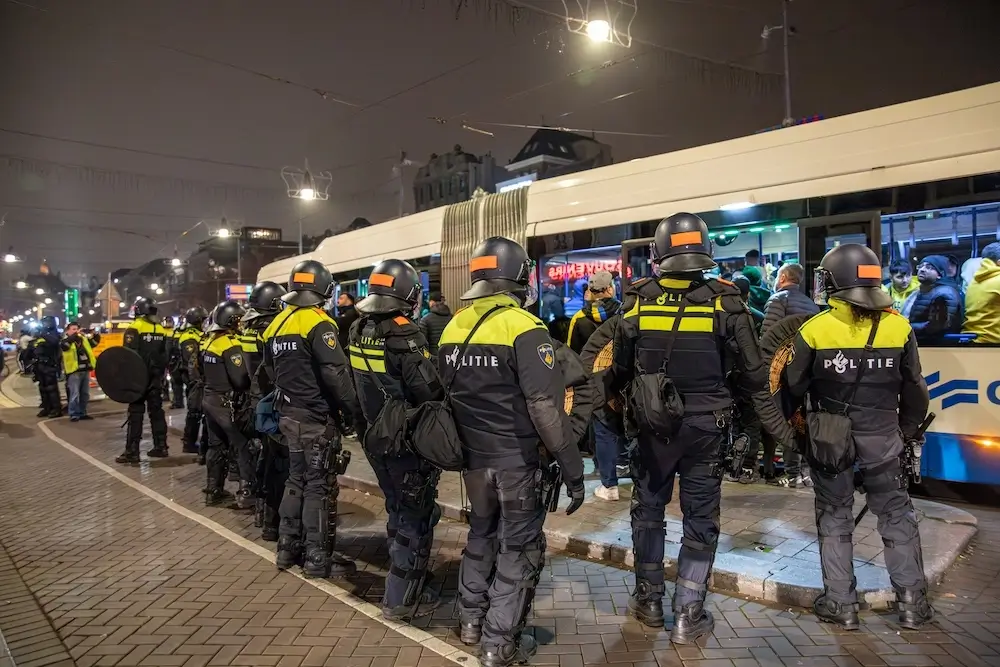Football Riots in Amsterdam: Maccabi Tel Aviv Fans Clash with Police After Ajax Defeat

Last Thursday, Amsterdam’s usually vibrant city center became the backdrop of unrest as fans of Maccabi Tel Aviv clashed with police and locals following their team’s heavy 5-0 defeat to Ajax. Tensions ran high as disappointed fans gathered, turning what started as a post-match protest, mixed with political influences, into a volatile scene.
Tensions Rise After Ajax’s Dominant Win
Ajax’s decisive 5-0 victory at the Johan Cruijff Arena left Maccabi Tel Aviv fans frustrated and eager to voice their discontent. Following the match, large groups of Maccabi supporters assembled in central Amsterdam, their anger escalating into clashes with law enforcement officers as they marched through the city. This unrest quickly drew attention, highlighting deeper tensions that extend beyond the football field, the Israel and Palestina conflict.
The Influence of Political Tensions: Israel-Palestine Conflict in the Background
Amsterdam, home to a diverse population that includes many Arabic residents, has seen high sensitivity around the Israel-Palestine topic. In recent months, this geopolitical conflict has been a hot topic in the city, contributing to the intense atmosphere on Thursday evening. The presence of Maccabi Tel Aviv supporters sparked further emotions, with some of the tensions linked to the ongoing situation between Israel and Palestine, adding a layer of complexity to the football riots in Amsterdam.
Timeline of Events: How the Football Riots Unfolded
Post-Match Gathering
The first signs of unrest were visible as Maccabi Tel Aviv fans, frustrated by the defeat, began gathering in Amsterdam’s city centre. Initially, these gatherings were peaceful, with fans expressing their disappointment through chants and discussions.
Escalation of Tensions
As more fans gathered, the atmosphere grew increasingly hostile. Political undertones were present in the chants, with emotions around the Israel-Palestine conflict blending into the crowd’s frustration over the game, and tensions began to spike. Palestinian flags were taken off houses and burned on the main square in Amsterdam. People were taking steel construction poles out of the ground and taking parts of wooden pallets to use it as weapons, leading to the football riots in Amsterdam. Watch the video of a independent young Dutch journalist here.
Police Response
When the situation intensified, police reinforcements were brought in to disperse the crowd and separate the Maccabi supporters from local people. However, their presence appeared to fuel more aggressive behavior among the crowd and a group of locals gathered around the police and Maccabi supporters, which led to more confrontations and throwing stones to each other.
Injuries and Arrests
The clash ultimately led to injuries and multiple arrests, with both fans and police officers affected. Damage was reported to nearby businesses and public property, highlighting the impact of the football riots in Amsterdam, beyond the football field.

Aftermath of the Football Riots in Amsterdam
The impact of the riots was felt across Amsterdam, with the events sparking a city-wide debate on fan behavior, security, and the influence of global conflicts on local events. For many residents and tourists, the evening’s unrest came as a shock, as the mix of football passions and political tensions played out on the city’s streets with police and anti-riot forces involved.
The Role of Football, Politics, and Community Tensions
Thursday’s events have reignited discussions on the responsibilities of football clubs and local authorities in managing fan behavior, particularly around politically charged matches. With Amsterdam being a city of cultural diversity, including a large Arabic community, awareness of the underlying issues surrounding the Israel-Palestine conflict has grown in recent months. Maccabi Tel Aviv’s presence in Amsterdam, combined with the game’s emotional aftermath, underscores the need for sensitivity and responsible celebration from fans to maintain peace. For the same reason, political issues and potential riots, Russian teams were ruled out of any European Competitions due to the Russia-Ukraine conflict.
Moving Forward: A Call for Responsibility Among Football Fans and Officials
Passionate support for football teams is a celebrated part of the sport. However, it is essential that fans practice responsibility and respect, especially in cities like Amsterdam where diverse communities coexist. Thursday’s events emphasize the importance of managing emotions, both on and off the field, to prevent political conflicts from spilling into sports arenas. Besides the sportive aspect of the riots, officials should reevaluate if it’s a good decision to allow supporters from conflict areas to join their club on away games outside of the country.

1 thought on “Football Riots in Amsterdam: Maccabi Tel Aviv Fans Clash with Police After Ajax Defeat”
Pingback: Adam Szalai: Medical Emergency | Netherlands vs Hungary 2024